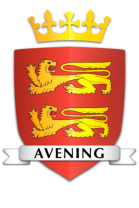

© Avening Parish Council 2023
“Preserve, Conserve, Enhance”
9 Charles Smith
Private: 4th Battalion Grenadier Guards Charles Smith was born in May 1895, the second of three sons born to Albert Smith of Avening, a stonemason, and wife Elizabeth Ann Eldridge, born Coates. Charles was an early volunteer for service, presenting himself in Gloucester as a recruit on the 23rd of November 1914. His attestation papers tell us that he was then 19 years and 189 days old, 5ft 11in (1.8m) tall, weighed 10 stone 10lbs (68 kgs) with brown hair and blue eyes. He was employed as a brass turner (possibly in Nailsworth at Johnson's Engineering) and stated his religion as Baptist. He may well have shown a preference for service with the Grenadier Guards as a number of villagers were already serving with that regiment and he was called onto their strength at Caterham in Surrey on Tuesday the 24th of November. He was given about nine months training with the 4th Battalion prior to them leaving for France on the 14th of August 1915. There they joined with other Guards units to form the 3rd Guards Brigade, part of XI Corps, all part of the 1st Army. This was under the command of Sir Douglas Haig with Sir John French having overall command of British Forces. There was to be a "Big Push" at Loos, designed to take place whilst the German army was concentrating on the Russian front. The aim was to advance 20 miles which, it was hoped, would force the Germans to withdraw further having lost the critical railway network in that region. XI Corps was held in general reserve at the outset of the battle which began on the 24th of September. To get to the front, it set out on the 20th, marching twenty miles throughout successive nights. Sir John French gave orders that the Guards Division should back up the remainder of the Corps, moving to an area close to Loos. They were warned to carry extra rations as it may be some time before their cookers could catch up with them. They also carried greatcoats on the march to the battle area. At 3 am on the 25th of September 1915 the 1st Army attacked and over the next 36 hours, despite heavy losses, advances were made. At 9.30 am Haig asked French for the reserves and part of XI Corps was released, but did not arrive until after noon, having been held up in the communications trenches that were full of wounded men, stretcher bearers and signals runners, at the same time being under fire. They came under Haig's command at 1.20 pm. The Guards Division was moved closer to the front line only to find the area allocated to them already occupied. The front line situation was chaotic. There were insufficient men available to exploit the gains and strong German resistance from their second line, now being reinforced, brought further advance to a halt. Believing the infantry had broken through near Hulluch, orders were sent out at 11.20 pm for a renewal of the attack at 11 am on the 26th. More chaos and heavy losses to the 1st Army occurred and, at last, in the evening of the 26th the Guards Division was deployed into the original British trenches, where they relieved other units now exhausted and battle weary. Here it was decided that the remainder of XI Corps would attempt to recapture the dominant Hill 70, taken early on the morning of the 26th, only to be retaken by a German counterattack a few hours later. The day of the 27th dawned misty and it was cloudy and raining all day and the 3rd Guards Brigade moved off at 4 pm, in column of four along the Vermelles to Loos road in an attempt to take Hill 70. They were caught by a heavy artillery barrage and suffered many casualties, our Charles Smith being one of them. (An eventual assault on Hill 70 was made by the Welsh Guards but they were destroyed by machine gun fire). He was declared missing on Monday the 27th of September 1915, his Next of Kin being informed on the 30th of October. Charles has no known grave and is remembered on the Loos Memorial, tended by the Commonwealth War Graves Commission. He was posthumously awarded the Victory Medal, the General Service Medal and the 1915 Star. He was 20 years old and unmarried. I am indebted to Charles' niece, Christine Benton, for her assistance.
AveningArchive
WW1 Heroes





© Avening Parish Council 2023
AveningArchive
9 Charles Smith
Private: 4th Battalion Grenadier Guards Charles Smith was born in May 1895, the second of three sons born to Albert Smith of Avening, a stonemason, and wife Elizabeth Ann Eldridge, born Coates. Charles was an early volunteer for service, presenting himself in Gloucester as a recruit on the 23rd of November 1914. His attestation papers tell us that he was then 19 years and 189 days old, 5ft 11in (1.8m) tall, weighed 10 stone 10lbs (68 kgs) with brown hair and blue eyes. He was employed as a brass turner (possibly in Nailsworth at Johnson's Engineering) and stated his religion as Baptist. He may well have shown a preference for service with the Grenadier Guards as a number of villagers were already serving with that regiment and he was called onto their strength at Caterham in Surrey on Tuesday the 24th of November. He was given about nine months training with the 4th Battalion prior to them leaving for France on the 14th of August 1915. There they joined with other Guards units to form the 3rd Guards Brigade, part of XI Corps, all part of the 1st Army. This was under the command of Sir Douglas Haig with Sir John French having overall command of British Forces. There was to be a "Big Push" at Loos, designed to take place whilst the German army was concentrating on the Russian front. The aim was to advance 20 miles which, it was hoped, would force the Germans to withdraw further having lost the critical railway network in that region. XI Corps was held in general reserve at the outset of the battle which began on the 24th of September. To get to the front, it set out on the 20th, marching twenty miles throughout successive nights. Sir John French gave orders that the Guards Division should back up the remainder of the Corps, moving to an area close to Loos. They were warned to carry extra rations as it may be some time before their cookers could catch up with them. They also carried greatcoats on the march to the battle area. At 3 am on the 25th of September 1915 the 1st Army attacked and over the next 36 hours, despite heavy losses, advances were made. At 9.30 am Haig asked French for the reserves and part of XI Corps was released, but did not arrive until after noon, having been held up in the communications trenches that were full of wounded men, stretcher bearers and signals runners, at the same time being under fire. They came under Haig's command at 1.20 pm. The Guards Division was moved closer to the front line only to find the area allocated to them already occupied. The front line situation was chaotic. There were insufficient men available to exploit the gains and strong German resistance from their second line, now being reinforced, brought further advance to a halt. Believing the infantry had broken through near Hulluch, orders were sent out at 11.20 pm for a renewal of the attack at 11 am on the 26th. More chaos and heavy losses to the 1st Army occurred and, at last, in the evening of the 26th the Guards Division was deployed into the original British trenches, where they relieved other units now exhausted and battle weary. Here it was decided that the remainder of XI Corps would attempt to recapture the dominant Hill 70, taken early on the morning of the 26th, only to be retaken by a German counterattack a few hours later. The day of the 27th dawned misty and it was cloudy and raining all day and the 3rd Guards Brigade moved off at 4 pm, in column of four along the Vermelles to Loos road in an attempt to take Hill 70. They were caught by a heavy artillery barrage and suffered many casualties, our Charles Smith being one of them. (An eventual assault on Hill 70 was made by the Welsh Guards but they were destroyed by machine gun fire). He was declared missing on Monday the 27th of September 1915, his Next of Kin being informed on the 30th of October. Charles has no known grave and is remembered on the Loos Memorial, tended by the Commonwealth War Graves Commission. He was posthumously awarded the Victory Medal, the General Service Medal and the 1915 Star. He was 20 years old and unmarried. I am indebted to Charles' niece, Christine Benton, for her assistance.WW1 Heroes



























